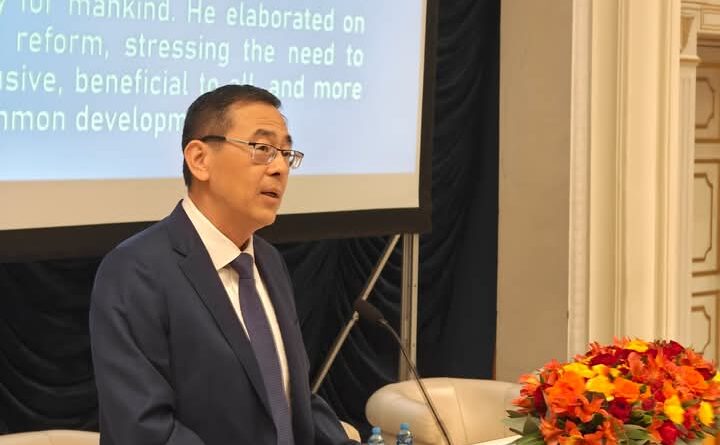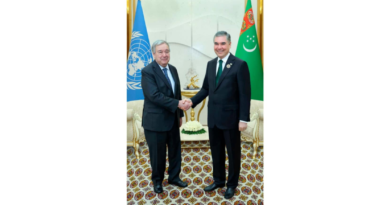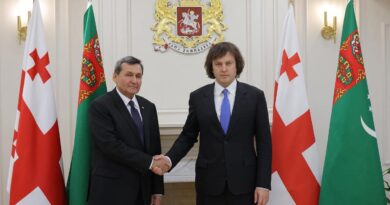Opening Speech by H.E. Ambassador ZHOU Qian at the Workshop on Building a Global Community of Shared Future and China-Georgia Cooperation
Today, we are joined by many friends who are familiar with or even specialized in international relations. Many of you might know that ten years ago, in 2014, which marked the 100th anniversary of breaking of WWI, some scholars in international studies argued that the situation of the world has many similarities with the period before WWI. Having enjoyed the dividends from technology advancement, economic prosperity and rapid growth for years, the world is facing with the challenges of the alternation of new and old paradigms and potential geopolitical tensions and miscalculations among major powers. A decade later, the world is experiencing the threat of the escalating crisis in Ukraine and the conflicts in the Middle East, as well as the challenges of de-globalization and decoupling. The recent use of ballistic missiles in the battlefield of Ukraine is a warning call to the whole world, which reminds us that we maybe only a miscalculation or a chain effect away from nuclear conflicts or even nuclear wars.
In the face of above-mentioned challenges and the question of what kind of future the world should have, bearing the future of the world in mind, eleven years ago, Chinese President Xi Jinping raised the question of our times: where should humanity be heading? His answer is to build a community with a shared future for mankind, which encapsulates how China proposes to solve the questions of what kind of world to build and how to build it. As the profound changes unseen in a century evolve, which is represented by the Ukraine crisis and the Palestinian-Israeli conflict, most countries in the world are realizing that, in the face of new problems and challenges, no country can stay insulated from their impact, still less resolve them by going it alone or resorting to exclusive blocs. Thus, President Xi’s idea of building a global community with a shared future has been gaining recognition and support.
First of all, as a scientific theory, the goal of the global community with a shared future is to build an open, inclusive, clean and beautiful world of lasting peace, universal security and shared prosperity; the pathway is promoting global governance that features extensive consultation and joint contribution for shared benefit; the guiding principle is to apply the common values of humanity; the basic underpinning lies in building a new type of international relations; the strategic guidance comes from the implementation of the Global Development Initiative (GDI), the Global Security Initiative (GSI) and the Global Civilization Initiative (GCI); and the most successful platform for action is high-quality Belt and Road cooperation. On this basis, we hope to work with all countries in the world to meet challenges and achieve prosperity for all.
Secondly, building a global community with a shared future should have a long-term perspective and all countries should jointly tackle the challenges faced by humanity. In today’s world, peace, security, development and global governance deficit are more prominent than ever. China is carrying forward the idea of the global community with a shared future to inject stability and positive energy into the turbulent world. At the Central Conference on Work Relating to Foreign Affairs of the CPC held at the end of last year, President Xi made it clear that China calls for an equal and orderly multipolar world and a universally beneficial and inclusive economic globalization. An orderly multipolar world means all countries, regardless of their size, are treated as equals; hegemonism and power politics are rejected; international affairs are not dominated by only a handful of countries and democracy is truly promoted in international relations. All countries should uphold the purposes and principles of the UN Charter and the universally recognized basic norms governing international relations. Universally beneficial and inclusive economic globalization means making the pie of economic development bigger and sharing it fairer so that all nations, all social groups, and all communities can take part in economic and social development and share the benefits. It means development imbalance, be it national or international, should be settled properly to realize common prosperity and development. It means supporting countries in pursuing a development path suited to their own national conditions. No one should impose one single development model onto the whole world. Unilateralism and protectionism for selfish gains at the expense of others must be discarded to keep the global industrial and supply chains stable and unimpeded, and to sustain the robust and dynamic growth of the world economy. This August, the 3rd Plenary Session of the 20th Central Committee of the CPC set the task to further deepen reform and promote Chinese modernization, which demonstrated China’s commitment to the historic responsibility of maintaining world peace and stability, promoting global openness and cooperation, reforming the global governance system and bringing the world together to modernization. At the just-concluded 19th G20 Summit, President Xi, bearing the idea of building a global community, took the pulse of today’s world and issued his prescriptions for global governance from the perspective of the historical cycle and the common development and prosperity for mankind. He elaborated on China’s vision of global governance reform, stressing the need to make global development more inclusive, beneficial to all, and more resilient, and build a just world of common development. President Xi proposed to improve global governance in economic, financial, digital and ecological sectors, called for building a world economy characterized by cooperation, stability, openness, innovation and eco-friendliness, and announced China’s eight actions for global development, including pursuing high-quality Belt and Road cooperation, supporting the G20 in carrying out practical cooperation for the benefit of the Global South, joining the Global Alliance Against Hunger and Poverty, proposing an Initiative on International Cooperation in Open Science alongside Brazil, South Africa and the African Union, and unilaterally opening our doors wider to the least developed countries. The important initiatives showcased China’s broad global vision and were in line with the trend of nowadays economic and technological trends. President Xi’s proposal has responded to the strong will of the Global South to seek equality and promote change, and has defined the right direction for improving global governance and given the confused world more assurance. China’s proposals, with both conceptual guidance and pragmatic paths, will have an important and far-reaching impact on addressing global challenges.
China continues to contribute to solving the new problems and challenges facing mankind. To seek political settlements of hotspot issues like the Ukraine crisis, China has released several important position papers and carried out shuttle or mediation diplomacy to advocate talks for peace. To support the Global South, China has mobilized nearly 20 billion US dollar in development funds, launched over 1100 projects and announced to give over 40 LDCs zero-tariff treatment for 100 percent tariff lines. To address non-traditional security challenges, China has taken the lead in UNGA to promote the adoption of resolutions like Enhancing International Cooperation for Artificial Intelligence Capacity Building and Promoting International Cooperation on Peaceful Uses in the Context of International Security, and continued to play its role as a major power in areas such as dealing with climate change and combating cross-border crimes.Thirdly, China and Georgia are good partners in building a global community with a shared future. Democracy is a value pursued by all. To apply democracy in global governance, we must let the voices and concerns of the Global South, which accounts for the majority of the world’s population, be heard and met, bridge the development gap and advocate more democracy in international relations. That is why Chinese diplomacy takes the relations with developing countries as the foundation. China remains a member of the Global South and will always stand with other developing countries including Georgia. Last year, China and Georgia established a strategic partnership. In the joint statement, both countries support the promotion of humanity’s common values of peace, development, equity, justice, democracy and freedom, respect all people’s independent choice of development paths suited to their national conditions, and promote the building of a community with a shared future.32 years since the establishment of diplomatic ties, China and Georgia have become good friends and partners for cooperation in building a global community of shared future. By adhering to the principle of mutual respect and win-win cooperation, the two countries become genuine strategic partners with solid political mutual trust, fruitful practical cooperation and active people-to-people exchanges. In recent years, Chinese enterprises have constructed several highway projects in Georgia, including E60 and North-South Highway, which have enhanced the connectivity within the country and facilitated Georgian people’s travel. Economic and trade cooperation between the two countries has continued to improve and upgrade, with the trade volume reaching 1.65 billion U.S. dollars from January to September this year, in which the export volume from Georgia to China has skyrocketed by 122% year-on-year, and the high-quality Georgian products, such as wines and spices, have made their way to China’s huge market; In May this year, China-Georgia visa-free agreement came into effect, and in September, Georgia and Chinese Hong Kong SAR reached a visa-free arrangement. From January to September the number of Chinese tourists visiting Georgia amounted to 67,000, a year-on-year increase of 101%. Georgia’s beautiful scenery, tasty wines and food are attracting more and more Chinese guests.Looking into the future, China and Georgia have brighter prospects in building a global community of shared future. Two weeks ago, President Xi Jinping and Peruvian President Dina Boluarte attended the inauguration ceremony of Chancay Port. With China’s help, Chancay Port has risen in just a few years and become the first smart and green port in South America. President Dina Boluarte said that this magnificent project will boost the integration of Latin America and open a new chapter for Peru’s economy. We hope and believe, with the deepening bilateral cooperation including big infrastructure projects like the Anaklia Port, Chinese Belt and Road Initiative will better dovetail with the Middle Corridor and Georgia’s juncture role in the region will be enhanced. China stands ready to deepen exchanges with Georgia in various fields, including politics, trade and economy, education, people-to-people cooperation, under President Xi Jinping’s three Global Initiatives. We will share more experience on the country’s governance and modernization, to promote the rejuvenation of China and Georgia, the two countries with ancient civilization, in the new era.I am sure that this workshop will be good opportunities for research institutes of China and Georgia to have in-depth exchanges and provide more insights and advice for developing China-Georgia relations. On behalf of the Chinese Embassy in Georgia, I would like to thank Sokhumi State University for co-organizing this workshop. My gratitude also goes to Lanzhou University and Beijing Language and Culture University. They have sent experts to join today’s event. I look forward to more sparks of ideas from all of you today.I wish this workshop a great success and wish the humanity a better future. Thank you.



